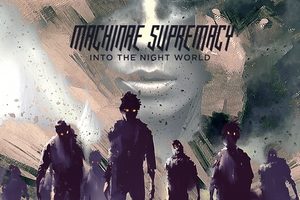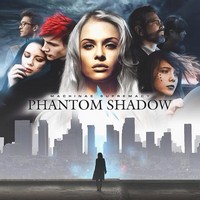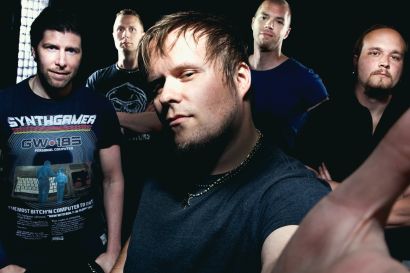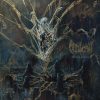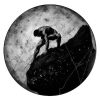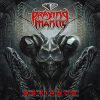Machinae Supremacy – Metal’s New Breed
Tuesday, 26th August 2014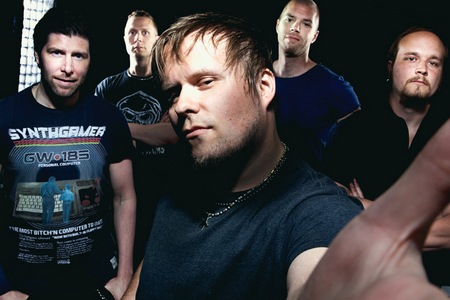
During our younger years, we often fill our time pursuing hobbies related to our interests. Sports, music, and video games probably rate very high in the adolescent and teenage categories – so should it be really surprising these days in heavy metal when musicians choose to combine those passions for a fresh, innovative take?
Sweden’s Machinae Supremacy are one such metal band who combine their love of alternative/ power sounds and video game music from the 1980’s and 90’s through the use of a SidStation, which features a chip that reproduces sounds of the Commodore 64 home computer (remember those relics some 3 decades ago?). Active since 2000, they’ve taken technology and used its power to their advantage, encouraging free sharing of their material from their official website to build up a steady fan base prior to signing their first significant record deal with current label Spinefarm.
Now on their seventh studio release, a concept album titled The Phantom Shadow, I needed to know more behind this eclectic, exciting band. Here are the thoughts of vocalist Robert Stjärnstöm, and do yourself a favor and become better acquainted with this quintet as they are making positive strides in both the gaming and metal communities.
Dead Rhetoric: What are your earliest memories surrounding music? Between friends and family who helped to shape your tastes in heavy metal and beyond? And at what point did you move from being a fan to actually practicing, performing, and starting a band?
Robert Stjärnstöm: I remember seeing the Disney film Oliver & Company with my mom when I was a kid. On the way home, I was humming the title song to myself so that I wouldn’t forget it. That night, I recorded what I could remember on a tape recorder and then I listened to that over and over again.
Back then getting a soundtrack to a movie wasn’t easy, especially if you lived in the North of Sweden. No internet, no record store that carried soundtrack music of any kind. As I grew older, I listened to some mainstream Swedish synth rock (Trance Dance was the name of one group) and later acquired CDs from Iron Maiden, Europe and Alice Cooper. Some friends and I used to take demo scene and video game tunes from my Amiga and record vocals for them, which was a lot of fun.
Later I started playing drums in a punk rock band and we actually managed to get “demo of the year” in Sweden’s biggest music magazine, Close-Up, in 1996. Or was it 1998? I forget. Anyway, I joined and left a few other bands along the way and ultimately started Machinae Supremacy together with one of my best friends, Kahl, in 2000. It took some time for Machinae Supremacy to become what it is today, but my decision that I wanted to be the lead singer for the first time in my life has definitely proven to be a very good idea in the years since.
Dead Rhetoric: The band started in 2000, what can you tell us about those early years, your initial ideas as far as shaping the band’s sound, and how you decided to incorporate a SidStation into the Machinae Supremacy sonic platform?
Stjärnstöm: I was already playing around with SID and synth sounds. I had bought the SIDStation and made some songs using it, when Jonne (guitarist Jonas Rörling) came over to my place for the first time, sporting his amp and Washburn guitar. He started riffing on this electronic SID/dance track I’d made and we just looked at each other knowing we’d found something awesome. The guitar complemented the SID so well and from that point there seemed to be no end to the ideas and inspiration.
Dead Rhetoric: Your first official studio album Deus Ex Machinae came out in 2004, but you made a lot in roads through compilation work, a live album, and a remix of video game theme music for “The Great Giana Sisters” as well. Was it important to establish yourselves in special/unique ways before ramping up things on a record deal level?
Stjärnstöm: It was never a conscious tactic really, we just started small, did some songs and pretty much instantly found our particular sound. We released those songs one by one or sometimes two at a time, online. And we started getting some fans. One of them contacted us suggesting we do a cover of some (any) old video game song because he felt our style was perfect for it. We chose “The Great Giana Sisters” and it was a big hit within that niche community. It really helped spread the word and get our music out there. We did Deus Ex Machinae as soon as we were ready to do more than just the occasional web release single.
Dead Rhetoric: Spinefarm Records signed the band in 2006, re-releasing a remixed version of Redeemer. They were impressed with your massive inroads you as a band made through file sharing and free downloads, averaging 100,000 downloads a month through your own website. What convinced you to take that next step up, and did Spinefarm worry about how to generate money through future studio product given your established efforts through file sharing?
Stjärnstöm: Even though we were doing alright on our own we had a big issue with promoters and festivals. Since we didn’t have a label a lot of them didn’t take us seriously. We were voted as most wanted band for this huge Swedish festival, but when we called the bookers, and they realized we “didn’t have a label” they told us to contact the demo booking. In spite of the number of votes we’d gotten on their own page. Needless to say, when Spinefarm contacted us, we saw not only a label we really loved since before (due to their roster) but a way to finally be taken seriously by the less forward-thinking promoters out there.
Spinefarm has never really worried about our ways. They’ve said that “we really can’t know if your openness to file sharing generates more or less sales,” meaning our openness might as well work as reverse psychology.
Dead Rhetoric: Out of your current discography, where do you see the biggest shifts Machinae Supremacy has made, either in terms of a surge in popularity, or just personal satisfaction with a particular album yourselves? I remember being very impressed with my first exposure to the band on Overworld for example…
Stjärnstöm: I believe most of us feel that A View from the End of The World is that one album that’s become our Appetite for Destruction, so to speak. Upon releasing that album we got our first ever (albeit brief) album chart listing, followed by Spinefarm sending us on a European tour with Children of Bodom, Ensiferum and Amon Amarth. Interestingly enough though, the reason we were chosen was because Janne (Warman; keyboardist) in Bodom had been listening like crazy to Overworld since that came out. So with that in mind, it’s easy to see how both albums worked in our favor.
Dead Rhetoric: The new album is Phantom Shadow, another stellar effort from the band and a concept record as well. Tell us about the writing and recording process for this, were there any challenges you faced as far as getting what you pictured in your mind and hearts to come out the way you intended for the final product?
Stjärnstöm: Thank you. I had the story already. I wrote this story back in 2002, and I’d always hoped that maybe I could make a graphic novel or something like that. But I’ve also chosen to not commit to that due to the time it would take, so the story has just been lying in wait since then. Some elements of it have leaked into songs we’ve made, but as we decided to make our next album a concept album, we realized that now was the time to resurrect this story and convert it into songs. We did it like you’d outline a novel. We established the beginning and the end, and some key plot points along the way. Then the rest of the songs were given a fixed point in the story and written and composed accordingly.
It’s hard to say if what we made is the same as what we saw when we began. It certainly feels right and it feels Machinae Supremacy. I think we try not to assume too much in the early stage of creation since we know that whatever we make has a life of its own and tends to become what it was supposed to as if it has a life of its own.
Our biggest challenge these days is that we rarely meet and do most of our work collaboratively online. It does create some issues both with technology and understanding each others’ ideas, but fortunately, Dropbox and Skype allows us to still work together as a band.
Dead Rhetoric: Who came up with the idea to add the percussive acoustic guitar sections in the 7:04 “Europa”? I’m familiar with the movement through a particular TED video I took in showcasing Preston Reed and Usman Riaz performing and jamming in this style… did it worry you how to properly incorporate this newer element without sacrificing the established Machinae Supremacy style?
Stjärnstöm: The “finger-style” acoustic guitar on “Europa” is performed by the very talented Mike Dawes, a Machinae Supremacy fan with his own successful music career. He told me he wanted to collaborate on a song as we were making Rise of a Digital Nation but there was no real track that did his talent justice on Rise, so we waited and made sure we had a track that would benefit from this on Phantom Shadow.
I believe that our style is so genre-transcendent as it is we don’t really have to worry about doing something too far out. When you ask our fans what genre they think we belong to, you get very varying answers depending on what songs they prefer. To add a unique element like the acoustic guitar in “Europa” feels risk free to us, as long as it makes the song better.
Pages: 1 2











